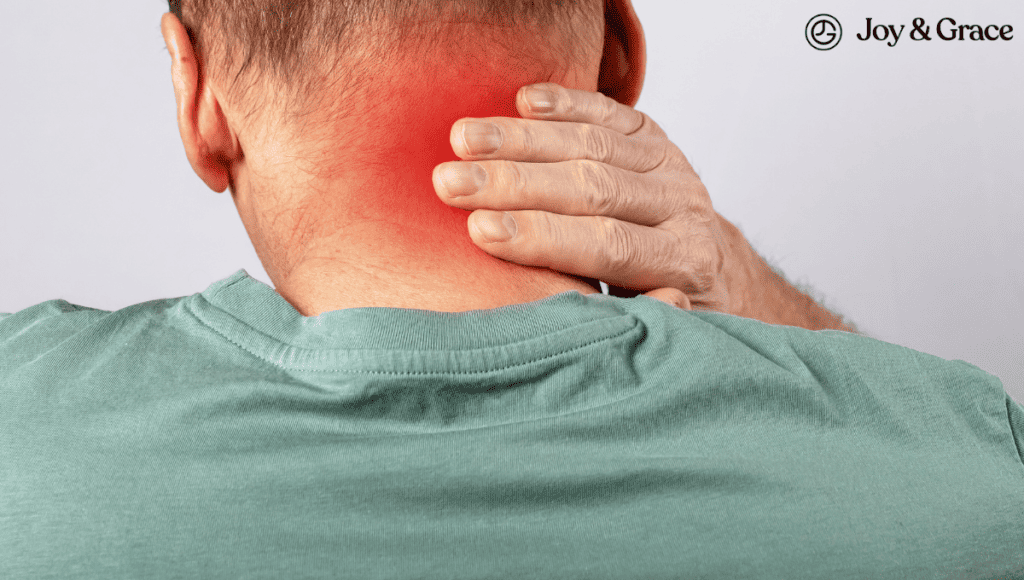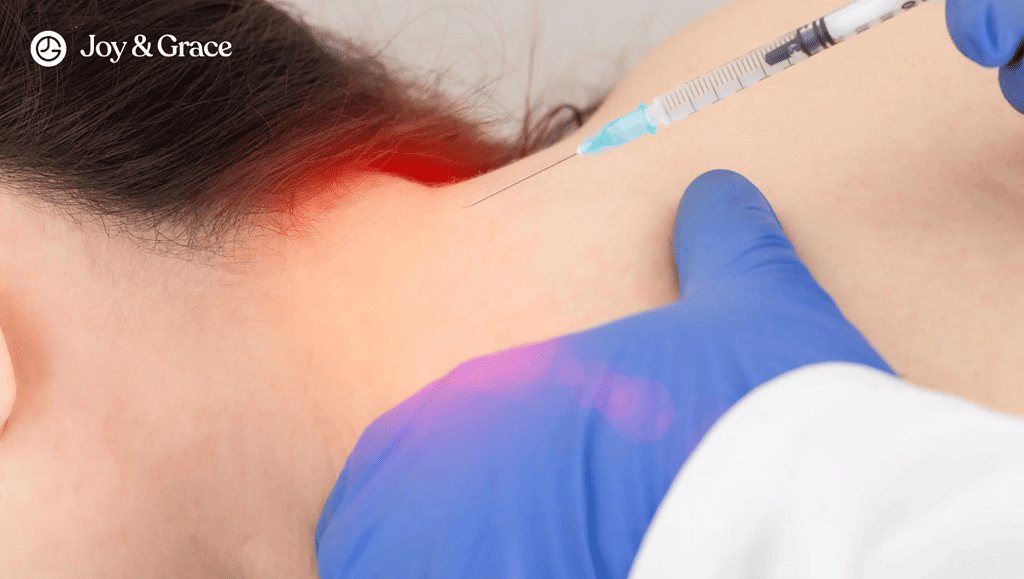Neck pain and acid reflux can each cause a lot of discomfort and worry in our daily lives. Sometimes they appear together, doubling the discomfort. You may wonder if having both of them is just an unlucky coincidence. But let us save the suspense by saying that acid reflux and neck pain can indeed be connected. Read below to discover everything you should know about the relationship between these two health conditions.
Can Acid Reflux Cause Neck Pain?

Let us begin by giving you a straightforward answer to the main question. Yes, acid reflux may cause neck pain.
This statement is also supported by the American Family Physician Journal, which lists neck pain as one of the symptoms of GERD.
Acid reflux is a simplified term for Gastro-Esophageal Reflux Disease or GERD.
Neck pain is one of the most common musculoskeletal disorders. It represents a major modern medical problem.
GERD is one of the most common digestive disorders in the US, affecting 1 in 5 people.
Currently, no known cause exists to explain the development of GERD. But there are quite a few risk factors that may lead to it. GERD occurs when stomach acid flows back into the esophagus toward the mouth. This leads to the two main symptoms of GERD:
- Burning chest pain, known as heartburn
- Regurgitation or swallowed food returning to the mouth.
So, how does the neck suffer from the acid backflow? Let us find out.
Acid reflux alone, without accompanying symptoms, does not qualify as GERD.
Acid reflux refers to the backward flow of acid in the digestive system. Therefore, this reflux can be classified as GERD only when it leads to symptoms.
For instance, physiologic reflux is considered normal. It typically occurs after a meal and lasts briefly. Physiologic reflux does not cause noticeable symptoms and rarely happens during the night. This type of reflux would not meet the criteria for a GERD diagnosis.
However, in this article, we will use the terms "acid reflux" and "GERD” interchangeably for simplicity and clarity.
Can GERD Cause Chest and Neck Pain?

Chest pain (described as a burning feeling in the chest or “heartburn”) is one of the hallmarks of GERD. So, based on what we also mentioned earlier regarding the neck, GERD can indeed cause chest and neck pain.
As you may know, the stomach is an organ that is acidic inside. Stomach acid is there to digest the food we take into our bodies. It is connected to the throat and mouth through the esophagus. The esophagus is a narrow tube in which food slides downward.
Now, the point of connection between the esophagus and the stomach is very important. This point contains a structure, which doctors call a sphincter. The sphincter is like a valve or door that allows food inside the stomach. It also stops the food and stomach acid from going back up. Thus, when this sphincter is damaged, stomach acid may flow back into the esophagus.
The strong acid irritates the nerve endings in the area, leading to chest pain or heartburn. The acid may also climb further into the throat lining, causing throat pain. The nerves in the chest and throat are interconnected with those in the nearby regions. This means that the pain may spread to the following areas:
- Back of the neck
- Shoulders
- Back
- Jaw
There is another mechanism by which GERD may cause neck pain. Let us see how. One of the symptoms of GERD is chronic coughing. Chronic coughing can result in forceful movements of the neck and chest. When coughing, your neck may involuntarily move fast, damaging the cervical vertebrae and neck muscles. Consequently, neck pain may appear.
Can I Feel Acid Reflux in My Neck?

As we mentioned, acid reflux may also affect the neck region. When it does, it feels like a burning neck pain sensation, a sore throat, or a neck lump. The feeling of having a neck or throat lump that disrupts your swallowing is called Globus Sensation.
The odds of acid reflux and heartburn spreading to the neck increase after eating a meal or lying down.
It is essential to note that just because you have neck or throat pain does not mean you have GERD. Read the article further to find out about the other symptoms of GERD.
GERD & Neck Muscles: Can Acid Reflux Make My Neck Feel Tight?
A sore throat, burning neck pain, or lump feeling is definitely a hassle to deal with. When you experience any of these feelings in your neck region, you suddenly find swallowing pretty difficult.
The increased effort to swallow may lead to neck and throat muscles tightening. This can give rise to even more discomfort. So, yes, acid reflux can make your neck feel tight.
Can GERD Cause Neck Pain and Headache?
We have established so far that GERD may be the factor behind neck pain. But, along with neck pain, acid reflux can affect the head too!
A headache resulting from or associated with acid reflux is sometimes called a “gastric headache.” Gastric headache is not a true medical diagnosis, though. It is instead a popular, easy-to-remember term to describe a headache that happens with GERD.
Many studies back the association between GERD and headaches (such as migraine headaches). According to a 2008 study, 30% of people with headaches suffer from GERD.
Whether one is causing the other or they are simply associated with each other needs further research.
Still, do pay a visit to your doctor if you suspect a gastric headache that goes along with your neck pain.
Can GERD Cause Neck and Shoulder Pain?
As we mentioned earlier, acid reflux may damage the lining of the esophagus and throat, causing pain. This pain may spread and cause discomfort in other areas, such as the neck and shoulder blades. So why can this happen?
Nerves usually run through a few body regions until they reach the spine. Irritation of the nerves leads to something called “referred pain.” The damage that the tissue lining of the esophagus and throat goes through may result in inflammation. Inflammation is a process that can also spread to the neck and shoulder blade nerves and muscles, adding to the discomfort.
Shoulder and neck pain or discomfort radiating from the chest, together with shortness of breath or sweating, may be symptoms of a heart attack. So, make sure to notify your doctor if you experience a feeling like this.
Can Acid Reflux Cause Neck and Jaw Pain?
Is it possible for the jaw to suffer from the effects of GERD? Unfortunately, yes. Besides causing neck pain and other referred pain types, acid reflux may also affect the jaw.
According to a 2019 study, GERD may be associated with chronically painful temporomandibular disorders (TMDs). TMDs include disorders of the jaw, temporomandibular joint, and chewing muscles.
Can Neck Pain Cause GERD?
Now we know that GERD can lead to neck pain. But what if we told you that the opposite also holds true? Neck pain is a type of pain that can have many causes, including:
- Cervical muscle strain or sprain,
- Torticollis,
- Whiplash injury,
- Myofascial pain dysfunction syndrome,
- Osteoarthritis,
- Rheumatoid arthritis, etc.
There is a certain nerve called the vagus nerve that runs through our bodies. It is a long nerve that starts from the brainstem, goes through the top cervical vertebrae, and supplies the whole digestive tract. This is why it is also known as the wandering nerve. The vagus nerve and the brainstem are vital in keeping the function of the digestive system normal.
Damage or abnormal positioning at the cervical vertebrae (C1 and C2) levels can also affect the vagus nerve and the brainstem. Some studies have shown that spinal damage or injury can indeed be a risk factor for GERD. As a result of the damage, changes in stomach acid production and flow may occur. In this sense, acid reflux, or GERD, may appear.
Additionally, neck pain, especially when it lasts, leads to reduced life quality and plenty of stress.
More stress in your life means more stomach acid production. More stress also means more chances of smoking and eating junk food. More stress often equates to less sleep.

All of these factors (and many others) add to the risk of developing GERD and making it worse with time. What happens when GERD gets worse? Yup, you guessed it. More neck pain and many other problems. As you can clearly see by now, this is a situation that doctors call a “vicious cycle.” One condition makes another worse, and vice versa, over and over again.
So, always remember to put your health first. Ignoring your pain is not a way out. We strongly recommend (again) that you seek a medical specialist's advice when experiencing neck pain. This way, you can treat your pain and prevent it from occurring again.
What Are the Symptoms of GERD?

Previously, we discussed that just because you have neck pain does not necessarily mean you have GERD.
In fact, neck pain alone, without heartburn or a globus sensation, is typically not caused by any type of acid reflux disease (such as GERD or Laryngopharyngeal Reflux).
So, let us see the other symptoms of GERD to get a good idea of what you can expect from this condition. Here are the most common acid reflux symptoms:
- Chest pain or heartburn. GERD can cause severe chest pain that mimics a heart attack. The pain can radiate to the back, neck, and arms, which can be scary and overwhelming.
- Difficulty swallowing (dysphagia). This can feel like food is stuck in your throat or chest, making it hard to eat or drink.
- Globus sensation. This is a feeling of choking or a lump in the throat.
- Severe regurgitation. Regurgitation is another common symptom of GERD. It's the sensation of acid flowing back into your throat or mouth, which can be severe and uncomfortable.
- Chronic coughing. GERD can cause a chronic cough that won't disappear. This can be due to the acid irritating the lining of the esophagus and lungs, leading to persistent coughing.
- Constant throat clearing. This symptom is caused by increased secretions and irritation of the throat lining.
- Sore throat or hoarseness. GERD can cause a sore throat or a hoarse voice due to the acid irritating the vocal cords and throat.
Nausea or vomiting. GERD can also cause severe nausea or vomiting, which can be distressing and affect their quality of life.
GERD symptoms usually become more noticeable after a meal and when lying down. They may also happen at night, causing sleeplessness and fatigue.
Doctors usually diagnose GERD based on the symptoms you may show. If your symptoms are unclear, doctors may suggest you undergo the following tests to confirm the diagnosis:
- An endoscopy
- A barium swallow or barium meal test
- Manometry
- 24-hour pH monitoring
- Various blood tests
How Should I Sleep With Neck Pain From Acid Reflux?

So, you are trying to get a good night’s sleep, but the double trouble that comes with GERD and neck pain won’t let you. We advise you to try to make some changes to your sleeping routine. Here are some tips that can help you sleep with neck pain from acid reflux:
- Use adequate headrests and pillows.
You can use a pillow or headrest to support and elevate your neck and keep it in a neutral position. This position helps reduce the strain on your neck muscles. It also prevents acid from flowing back to your esophagus and mouth.
- Sleep on your left side.
As mentioned, sleeping on your back can worsen neck pain and acid reflux. Thus, it is advisable to sleep on your left side. This position helps maintain a neutral spinal alignment and prevents acid backflow.
- Avoid eating before bedtime.
Eating before bedtime can worsen acid reflux, making it difficult to sleep. Thus, avoiding eating at least three hours before bedtime is ideal. Avoid foods that especially trigger acid formation (called trigger foods), such as spicy foods, fatty foods, and chocolate.
What Are the Severe Symptoms of GERD?
There are the so-called “alarm symptoms” of GERD, which may indicate that complications of acid reflux have developed. These complications include strictures, ulceration, and malignancy. The more severe, alarming GERD symptoms include the following:
- Odynophagia (painful swallowing), along with dysphagia (difficulty swallowing),
- Anemia,
- Bleeding, and
- Weight loss.
Heartburn, which spreads to the neck, shoulders, and jaw, may mimic the typical symptoms of a heart attack. These symptoms can be alarming and scary, so give them the medical attention they deserve.
How to Relieve Neck Pain From Acidity?

We have reached one of the topic points that may interest you the most. What is the best way to ease the neck pain and discomfort from GERD? If you do not have any of the alarming symptoms we listed above, your first step should be lifestyle changes. These changes help relieve the pain and prevent it from happening again. They include the following:
- Elevate your head off the bed (HOB elevation). Prop up your bed or use headrests to elevate the upper part of the body. This prevents acid backflow.
- Maintain good posture. Poor posture can put extra strain on your neck, worsening your pain. To avoid this, be mindful of your posture throughout the day.
- Get regular exercise. Regular exercise can help reduce acid reflux symptoms, including neck pain. Exercise can also help reduce stress, a known risk factor for acid reflux.
- Eat smaller, more regular meals
- Try to lose excess weight. Obesity is a risk factor for GERD.
- Wear loose clothing. Tight-fitting clothing can put pressure on your stomach, increasing acid reflux symptoms. Instead, opt for loose-fitting clothing that is not too tight on your stomach.
- Avoid smoking and heavy alcohol consumption.
Avoid nighttime snacks, large meals, fatty foods, spicy foods, citrus, chocolate, and caffeine.
Other medical treatment options are also available for GERD. These methods include medicines and surgery. They can be combined with the above-mentioned lifestyle changes or come into play if the changes do not work.
Medications usually work by either:
- Countering the acid effects, or
- Blocking acid production from the stomach cells.
GERD meds include:
- Over-the-counter antacids,
- H2 blockers, such as cimetidine, and
- Proton Pump Inhibitors (PPIs), such as omeprazole or pantoprazole.
Anti-reflux surgery (Fundoplication) has had mixed success against GERD. This procedure tightens the sphincter between the esophagus and the stomach.
Takeaway
Acid reflux or Gastroesophageal Reflux Disease (GERD) can be a cause of neck pain. GERD is one of the most common gastrointestinal disorders.
GERD occurs when stomach contents (acid) flows back into the esophagus toward the mouth. The two main symptoms of GERD are heartburn and regurgitation.
The strong acid irritates the nerve endings in the esophagus. The acid may also climb further into the throat lining, causing throat pain. The nerves in the chest and throat are interconnected with those in the nearby regions. This means that the pain may radiate to the following areas:
- Back of the neck
- Shoulders
- Back
- Jaw
Neck pain from GERD feels like a burning neck pain sensation, sore throat, or a neck lump. The odds of acid reflux and heartburn spreading to the neck increase after eating a meal or lying down.
Just because you have neck or throat pain does not mean you have GERD.
The best methods to relieve neck pain from acid reflux include the following:
- Lifestyle changes
- Anti-reflux medications
- Anti-reflux surgery.















